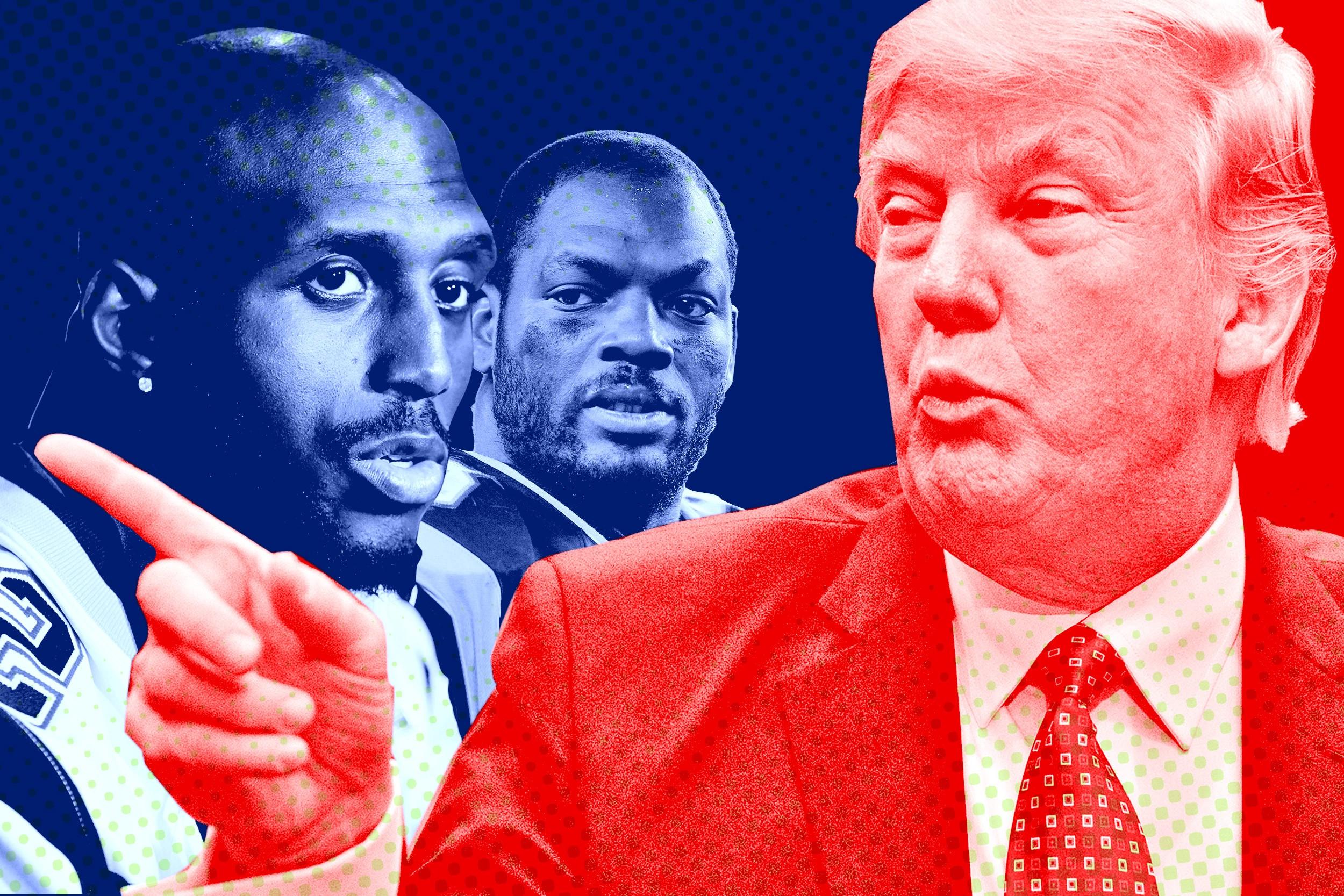
When teams win national sporting championships, they usually get a few things. They get big, gaudy rings. They get a trophy. They get a ticker-tape parade through their respective cities. And then a while later, as the aura of champagne lingers, they get to visit the White House, where they’re welcomed by the president of the United States.
The Patriots, who beat the Falcons 34–28 in the Super Bowl on Sunday, are up next. Already, a handful of stars have said they won’t join the team on its visit to Washington, D.C., in protest of the presidency of Donald Trump: Tight end Martellus Bennett vowed to stay home before New England even won, and he is now joined by defensive back Devin McCourty. Running back James White, who broke Super Bowl records for points (20) and catches (14) and scored the game-winning touchdown in overtime, and defensive end Rob Ninkovich have also said they might not attend; linebacker Dont’a Hightower has said he won’t be there because he has “been there, done that.”
Whether victorious athletes would turn up for honors at the Trump White House has been an open question since before the 45th president assumed office. Now, with stars of the franchise he is most closely associated with declining to visit, we might be getting closer to an answer: These ceremonies will have an asterisk from here on out. This isn’t inconsequential — because for as much as championship visits are about fêting athletes, the tradition also serves a vital role for the president: It provides a chance to briefly dial back on politics and appeal to a broader base. And now, it’s beginning to seem as though Trump might not be able to do that — either because of his own tendencies, the refusal of those around him to engage, or both.

It says something about this country that one of the things we expect from our leader is that among his usual guests — the strategists and staff, lawmakers, foreign heads of state and dignitaries, service members, and to-be-honored luminaries — he include each batch of sporting champions. In a given year, victors from the NFL, MLB, NBA, WNBA, NHL, NCAA Division I basketball (men’s and women’s), and the College Football Playoff, among others, receive invitations to stop by and celebrate. The tradition has been around for some time: Andrew Johnson was the first to have teams over to the White House, welcoming the Brooklyn Atlantics and Washington Nationals amateur baseball clubs in 1865. The World Series victor has been coming since at least 1924. The NBA first came in 1963 (the Celtics, perhaps unsurprisingly under John F. Kennedy’s watch) and the NFL in 1980 (the Steelers, with Jimmy Carter). The visits were irregular until Ronald Reagan codified the practice, and now, the understanding is this: To win a major championship is to merit executive recognition.
If you’re an athlete, this is, ostensibly, a terrific honor. It’s also just some good, old-fashioned fun: the dressing up and going to Washington, the selfies in the East Room, the photo op at the press secretary’s podium, the reveling in the victory on yet another big stage. And then, of course, there’s this: the chance to hobnob, however briefly, with the commander-in-chief.
The president, meanwhile, gets something else: an opportunity to stand before his sport-loving fellow Americans, land some easy jokes, and seem, in the binary we so often use for our politicians, like someone you’d like to get a beer with.
Barack Obama was great at hobnobbing with famous athletes. Helped along by his own avid sports fandom, Obama seemed to rejoice in his duties. He yelled “Omaha!” at the Broncos. He told the Crimson Tide to call him “Oh-Bama.” He riffed on the Royals’ nicknames. Michelle Obama stepped in to dunk on LeBron James.
It was silly. It was nice. Of course, whether or not you like a president typically comes down to whether or not you like his policies. But goofing off on social media and appearing relatable to people on the internet certainly can’t hurt.
Trump, you might have heard, is not widely liked: He entered office with historically low approval ratings, which have continued to drop in the weeks since his inauguration. Sports seemed like an area in which he might prevail: He’s a famous schmoozer, after all; he golfed with Tiger Woods in December and has made a show of his friendships with Tom Brady, Bill Belichick, and Robert Kraft. But still: That Bennett and McCourty have written the event off and may still be joined by other teammates is no small thing.
This is not the first time an athlete’s refusal to visit the White House has been considered in a political context. Larry Bird declined to visit Reagan’s White House with the Celtics in 1984; Michael Jordan golfed instead of attending a 1991 ceremony with George H.W. Bush. Tom Brady’s absence two years ago was judged by many to be in response to a comment Obama’s press secretary made about Deflategate.
This, though, feels like something else entirely: a loss of the presidency’s luster. Trump’s White House has yet to dabble in the kinds of buzzy missives his predecessor made such use of, perhaps owing to Trump’s much smaller staff, or to a deeper aversion to the sillier corners of social media. For all his use of Twitter, Trump the candidate had no time for the lighthearted messaging that often intersperses campaigns; all things being equal, he prefers to beat a war drum, as he did at the Republican National Convention in July. He has yet to ease off divisive campaign rhetoric — so even given the opportunity for apolitical positivity, it’s not clear that he would take it. Plus, it’s hard to imagine a man notoriously leery of self-deprecation intentionally pushing his bad jokes to go viral. And if the abstaining Patriots are any indication, he won’t even have many opportunities.

